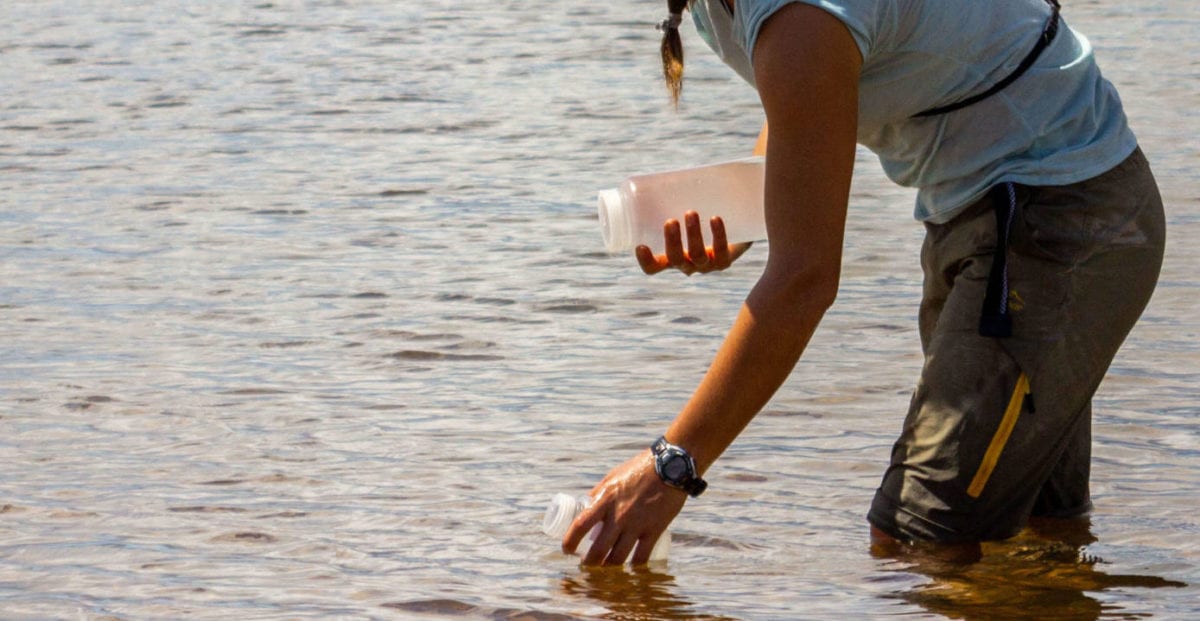
Hydrology is a fascinating field that explores the intricate workings of water in our environment. Hydrologists play a crucial role in studying and managing water resources, helping to ensure its sustainable use for future generations. They investigate how water moves through various systems such as rivers, lakes, and groundwater, and analyze the interactions between water and the surrounding environment.
In this article, we will delve into 12 captivating facts about hydrologists that highlight the importance of their work and the breadth of knowledge they possess. From studying climate change impacts on water resources to assisting in flood forecasting and water management, hydrologists are at the forefront of understanding and making decisions about our most vital natural resource – water.
Key Takeaways:
- Hydrologists study water movement and help manage resources, protect from pollution, and predict climate impacts, ensuring clean water for all.
- Hydrologists play a vital role in understanding and protecting Earth’s water systems, from preventing floods to managing international water cooperation.
Hydrologists study the movement and distribution of water on the Earth’s surface.
Hydrologists are scientists who specialize in understanding the complex dynamics of the Earth’s water systems. They study rivers, lakes, oceans, groundwater, and even the atmospheric water vapor. Their work involves analyzing data, conducting field surveys, and using models to predict future water patterns.
Hydrologists play a vital role in managing and conserving water resources.
One of the primary responsibilities of hydrologists is to assess water availability and quality. They help governments, organizations, and communities make informed decisions about water resource management, such as implementing water conservation measures, developing irrigation strategies, and planning for sustainable water use.
Hydrologists investigate the impacts of climate change on water systems.
With the increasing concern about climate change, hydrologists are at the forefront of understanding and predicting its effects on water resources. They analyze historical data, monitor changes in precipitation patterns, and develop models to project future scenarios, helping policymakers and communities adapt to the changing conditions.
Hydrologists use advanced technologies to collect data.
Hydrologists employ a wide range of tools and technologies to gather information about water systems. This includes remote sensing techniques, such as satellite imagery and aerial surveys, as well as ground-based instruments like water level gauges, streamflow meters, and weather stations. These tools provide valuable data for analysis and modeling.
Hydrologists study the interactions between water and the environment.
Understanding how water interacts with the environment is crucial for effective water management. Hydrologists investigate the impact of human activities, such as urbanization and agriculture, on water quality and quantity. They also study the ecological processes in rivers and wetlands, contributing to the conservation of aquatic ecosystems.
Hydrologists contribute to disaster management and flood prevention.
Hydrologists play a critical role in assessing flood risks and developing flood forecasting models. By analyzing rainfall patterns, river levels, and soil moisture content, they provide early warning systems to help communities prepare for potential flooding events. Their work aids in minimizing property damage and saving lives.
Hydrologists collaborate with other scientists and experts.
Given the interdisciplinary nature of water science, hydrologists often collaborate with geologists, meteorologists, engineers, and policymakers. By working together, they can address complex water-related challenges and develop comprehensive solutions that consider all aspects of water resource management.
Hydrologists study water pollution and develop strategies for remediation.
Water pollution poses a significant threat to the environment and human health. Hydrologists investigate the sources and effects of pollution in water bodies, develop monitoring strategies, and propose remediation measures to restore water quality. Their work aims to protect ecosystems, ensure safe drinking water, and sustain aquatic life.
Hydrologists contribute to understanding the water-energy-food nexus.
The water-energy-food nexus is the interconnectivity between these three essential resources. Hydrologists analyze the intricate relationships between water availability, energy production, and agricultural practices. By understanding this nexus, they can develop sustainable approaches that balance water, energy, and food security.
Hydrologists study the impacts of human activities on water scarcity.
In regions affected by water scarcity, hydrologists assess the causes and consequences of this issue. They analyze the effects of population growth, industrial development, and climate variability on water availability. This knowledge helps in devising strategies to mitigate water scarcity and ensure equitable distribution of this vital resource.
Hydrologists contribute to groundwater management and protection.
Groundwater is a crucial water source for drinking, agriculture, and industrial purposes. Hydrologists study the movement and quality of groundwater, evaluate its sustainability, and develop strategies to protect it from contamination. Their work ensures a reliable and clean groundwater supply for current and future generations.
Hydrologists play a key role in international water cooperation.
As water resources often transverse national boundaries, hydrologists contribute to international water governance and cooperation. They participate in transboundary river basin management, negotiate water-sharing agreements, and facilitate dialogue between countries, fostering peaceful and sustainable water management practices.
Conclusion
Hydrology is a fascinating field that provides valuable insights into the Earth’s water systems. Hydrologists play a crucial role in studying, managing, and protecting water resources. They contribute to various sectors such as environmental conservation, agriculture, urban planning, and disaster management. With their expertise, they are able to analyze and interpret complex data to address water-related challenges and find sustainable solutions.
Through their work, hydrologists help us better understand how water flows through the environment, from rivers and lakes to groundwater and glaciers. Their research helps us predict and mitigate the impacts of floods, droughts, and other extreme weather events. Additionally, hydrologists contribute to the development of water supply systems, ensuring safe and reliable access to clean water for communities around the world.
So, the next time you take a sip of water or enjoy a dip in a lake, remember the hydrologists who have devoted their careers to studying and protecting our precious water resources.
FAQs
1. What is hydrology?
Hydrology is the scientific study of water in the environment, including its occurrence, distribution, movement, and quality.
2. What does a hydrologist do?
A hydrologist is responsible for studying and managing water resources. They collect data, analyze water flow patterns, assess water quality, and develop strategies for sustainable use and management of water.
3. What are the major branches of hydrology?
The major branches of hydrology include surface water hydrology, groundwater hydrology, atmospheric hydrology, and eco-hydrology.
4. What skills are important for a hydrologist?
Key skills for hydrologists include data analysis, modeling, fieldwork, computer programming, and knowledge of hydrological software and equipment.
5. What career opportunities are available for hydrologists?
Hydrologists can work in various sectors, including government agencies, research institutions, consulting firms, environmental organizations, and educational institutions. They can also contribute to climate change research and water resource management projects.
6. How does hydrology help in disaster management?
Hydrology helps in predicting and managing disasters such as floods and droughts. It provides valuable data and insights for early warning systems, floodplain mapping, and emergency response planning.
7. Is hydrology important for environmental conservation?
Yes, hydrology plays a vital role in the conservation of ecosystems and natural habitats. It helps in understanding water requirements for flora and fauna, maintaining water balance, and protecting aquatic ecosystems.
8. How does hydrology contribute to agriculture?
Hydrology helps in optimizing irrigation practices, managing water resources for agricultural production, and assessing the impact of climate change on crop water requirements.
9. Can you pursue a career in hydrology with a bachelor’s degree?
Yes, a bachelor’s degree in hydrology, environmental science, or a related field can provide entry-level career opportunities in hydrology. However, advanced positions often require a master’s or doctoral degree.
10. How does hydrology benefit society?
Hydrology benefits society by providing clean and safe water supply, supporting sustainable agriculture, protecting ecosystems, managing water-related disasters, and contributing to climate change adaptation and mitigation strategies.
Hydrologists' fascinating work extends beyond these captivating facts. Their scientific expertise helps protect Earth's precious water resources and ensures a sustainable future for all. Want to learn more about this crucial field? Explore the extraordinary world of hydrology and uncover even more mind-boggling truths about how water shapes our planet. Dive into the science behind water's incredible journey and gain a deeper appreciation for hydrologists' tireless efforts to safeguard this life-giving resource.
Was this page helpful?
Our commitment to delivering trustworthy and engaging content is at the heart of what we do. Each fact on our site is contributed by real users like you, bringing a wealth of diverse insights and information. To ensure the highest standards of accuracy and reliability, our dedicated editors meticulously review each submission. This process guarantees that the facts we share are not only fascinating but also credible. Trust in our commitment to quality and authenticity as you explore and learn with us.


